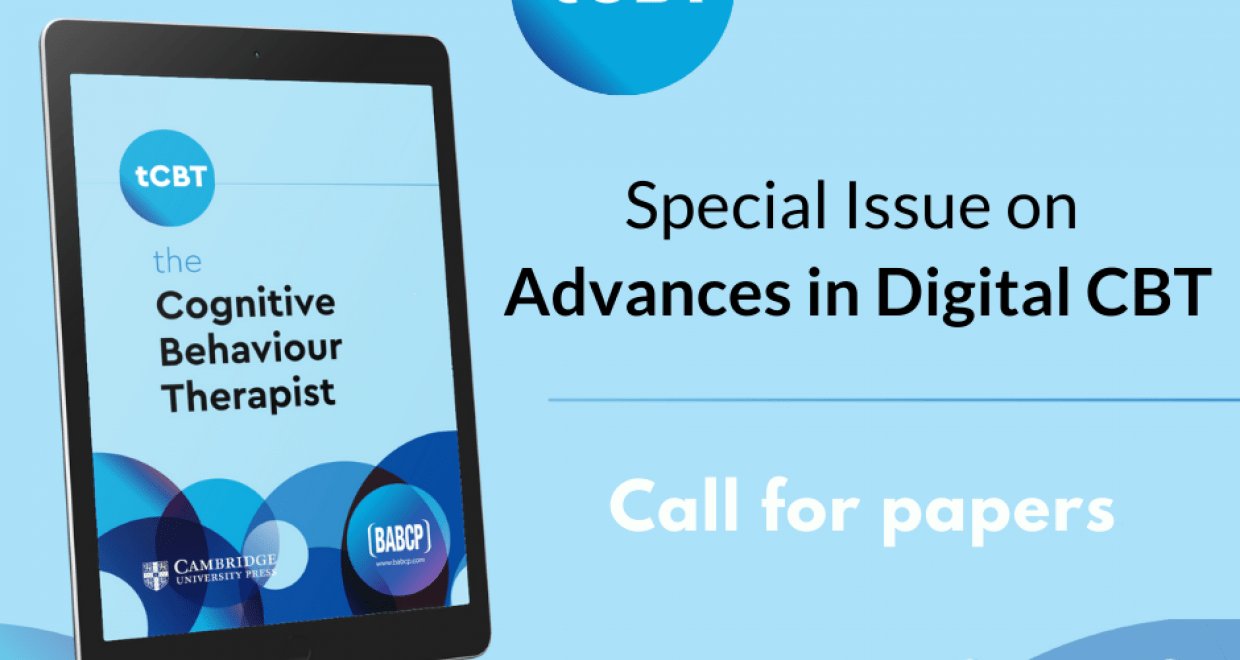Advances in Digital CBT: the Cognitive Behaviour Therapist Special Issue
We are pleased to announce the launch of the ‘Advances in Digital CBT’ special issue of the Cognitive Behaviour Therapist. Articles in this issue will be published over the coming few months and will be available to view here.
Digital CBT is a wide-ranging and rapidly growing field, that can be broadly defined as the use of digital tools, platforms, and devices to deliver or enhance CBT assessment, formulation, treatment, training and supervision. While this has been an active area of research and clinical practice for over 30 years, the Covid-19 pandemic has provided a powerful driver of change in the field, as practitioners and services across the world have turned to digital technology to continue their valuable work when traditional ‘in-person’ methods were not possible.
We therefore now have an important opportunity to advance the evidence base for Digital CBT; to examine and evaluate our practice and explore how digital technologies can be used in innovative and creative ways to best meet the needs of the people we work with. We received a number of interesting submissions for this special issue. Below, we aim to provide a brief overview of the topics that will be covered.
Articles in this issue will focus on various technologies, including telephone or video conferencing, mental health apps, and internet-delivered CBT. In general, the articles provide practical information about: 1) the quality of mobile apps available to clinicians; 2) outcomes of services delivered via telephone and video technology in routine care; and 3) user experiences with various technologies. Reflecting the critical importance of providing CBT early in life, about half of the articles are specifically focused on the use of technology with youth or younger adults. Readers will take away practical information, but also learn about the importance of qualitative methods and mixed methods to improve the use of technology in CBT. In our initial review of the articles, it is evident that while there is clear reason to be optimistic about the use of technology in the delivery of CBT, there is considerable room for development, especially in the area of mental health apps and in tailoring technology to meet the needs of specialized groups. In accordance with the aims of the Cognitive Behaviour Therapist, the articles in the Digital CBT special issue will contribute to the theory, practice and evolution of CBT.
About the Authors:

Dr. Graham Thew is a Senior Academic Clinical Psychologist at Oxford Health NHS Foundation Trust and the Oxford Centre for Anxiety Disorders and Trauma. He is involved in the development and dissemination of Internet-based cognitive therapy programs for social anxiety and PTSD and researches how digital platforms and tools can be used to enhance clinical outcomes in psychological therapies.

Dr. Heather Hadjistavropoulos is a Professor of Psychology at the University of Regina, Executive Director of the Online Therapy Unit(which provides services to residents across Saskatchewan), and Director of the Public Safety Personnel Internet-delivered Cognitive Behaviour Therapy (PSPNET) program (which provides services to public safety personnel across Canada). Dr. Hadjistavropoulos’ program of research is focussed on optimizing the delivery of internet-based cognitive behaviour therapy for anxiety and depression, chronic health conditions, and alcohol misuse within Canada, with particular attention to using research to tailor services to address patient, therapist, and organizational needs.

Dr. Alexander Rozental is a Swedish Licensed Clinical Psychologist with a training in Cognitive Behaviour Therapy. He is an Associate Professor at the Department of Psychology at Uppsala University and affiliated researcher at Karolinska Institute and UCL. His research involves assessment and treatment via the Internet, primarily Internet-based Cognitive Behaviour Therapy for common mental disorders. He also studies the occurrence and characteristics of negative effects of psychological treatments. Alexander Rozental works clinically at a private practice in Uppsala, Sweden, and is also an Associate Editor for the journal Cognitive Behaviour Therapy.






